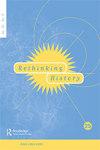The canon in history
IF 0.8
2区 历史学
Q1 HISTORY
引用次数: 0
Abstract
ABSTRACT From the 1970s onwards, postmodern, postcolonial and feminist criticism has reactivated the disapproval of the canon. Its academic and pedagogical usefulness remains challenged by historians who have generally been skeptical of its critical worth, its role as an instrument of hierarchization and standard of quality. Both the justification for the existence of the canon in history – which affects its content and function – and the criteria for the selection of an alleged canon of history – which affects its form and is concretized in a list – has been questioned. Nevertheless, in the early 2000s, there were major debates in some northern European countries about the development of historical canons as part of their historical education. These precedents show that the canon has its detractors and generates controversy, but in the end it matters. On the basis of a flexible definition and dynamic application, this article examines the place of the canon in (and of) history, arguing its relevance in historiography: its formation, key turning points, convenience, usefulness, and the desirability of its existence itself. This leads to questions such as: What are the epistemological conditions that make the durability of certain historical works and the discarding of others possible? What determines the systematic inclusion and exclusion of texts in bibliographical lists or in the indexes of the histories of historiographies? Why do the major canonical works usually imply a break with the past but, paradoxically, remain there when later works enter the list?历史上的正典
自20世纪70年代以来,后现代主义、后殖民主义和女权主义的批评重新激活了对经典的反对。它的学术和教学用途仍然受到历史学家的质疑,他们通常对它的批判价值、它作为等级制度工具和质量标准的作用持怀疑态度。历史正典存在的理由——影响其内容和功能——以及选择所谓的历史正典的标准——影响其形式并具体化在清单中——都受到质疑。然而,在21世纪初,一些北欧国家就历史正典的发展作为其历史教育的一部分进行了重大辩论。这些先例表明,正典有批评者,也会引发争议,但最终它还是重要的。在灵活定义和动态应用的基础上,本文考察了正典在历史中的地位,论证了它与史学的相关性:它的形成、关键转折点、便利性、有用性以及它存在本身的可取性。这就引出了这样的问题:是什么认识论条件使得某些历史著作得以留存,而另一些则被抛弃?是什么决定了书目列表或史学编撰的历史索引中文本的系统收录和排除?为什么主要的经典作品通常意味着与过去的决裂,但矛盾的是,当后来的作品进入名单时,它们仍然存在?
本文章由计算机程序翻译,如有差异,请以英文原文为准。
求助全文
约1分钟内获得全文
求助全文
来源期刊

Rethinking History
Multiple-
CiteScore
1.20
自引率
0.00%
发文量
26
期刊介绍:
This acclaimed journal allows historians in a broad range of specialities to experiment with new ways of presenting and interpreting history. Rethinking History challenges the accepted ways of doing history and rethinks the traditional paradigms, providing a unique forum in which practitioners and theorists can debate and expand the boundaries of the discipline.
 求助内容:
求助内容: 应助结果提醒方式:
应助结果提醒方式:


